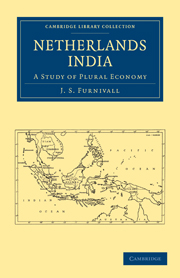Book contents
- Frontmatter
- INTRODUCTION
- Contents
- TERRITORIAL DIVISIONS
- NETHERLANDS INDIA
- AUTHOR'S PREFACE
- LIST OF GENERAL REFERENCES
- GLOSSARY
- MEASURES AND CURRENCY
- THE MALAY ARCHIPELAGO, IN COMPARISON WITH EUROPE
- Chapter I INDONESIA, TO 1600
- Chapter II THE EAST INDIA COMPANY, 1600–1800
- Chapter III THE YEARS OF CONFUSION, 1795–1815
- Chapter IV THE YEARS OF UNCERTAINTY, 1815–1830
- Chapter V THE CULTURE SYSTEM, 1830–1850
- Chapter VI THE TRANSITION TO LIBERALISM, 1850–1870
- Chapter VII LIBERALISM, 1870–190
- Chapter VIII EFFICIENCY, WELFARE AND AUTONOMY
- Chapter IX ADMINISTRATIVE AND POLITICAL REFORMS
- Chapter X ECONOMIC PROGRESS
- Chapter XI SOCIAL ECONOMY
- Chapter XII SOME EFFECTS OF THE CRISIS OF 1929
- Chapter XIII PLURAL ECONOMY
- INDEX OF REFERENCES
- GENERAL INDEX
Chapter V - THE CULTURE SYSTEM, 1830–1850
Published online by Cambridge University Press: 07 September 2010
- Frontmatter
- INTRODUCTION
- Contents
- TERRITORIAL DIVISIONS
- NETHERLANDS INDIA
- AUTHOR'S PREFACE
- LIST OF GENERAL REFERENCES
- GLOSSARY
- MEASURES AND CURRENCY
- THE MALAY ARCHIPELAGO, IN COMPARISON WITH EUROPE
- Chapter I INDONESIA, TO 1600
- Chapter II THE EAST INDIA COMPANY, 1600–1800
- Chapter III THE YEARS OF CONFUSION, 1795–1815
- Chapter IV THE YEARS OF UNCERTAINTY, 1815–1830
- Chapter V THE CULTURE SYSTEM, 1830–1850
- Chapter VI THE TRANSITION TO LIBERALISM, 1850–1870
- Chapter VII LIBERALISM, 1870–190
- Chapter VIII EFFICIENCY, WELFARE AND AUTONOMY
- Chapter IX ADMINISTRATIVE AND POLITICAL REFORMS
- Chapter X ECONOMIC PROGRESS
- Chapter XI SOCIAL ECONOMY
- Chapter XII SOME EFFECTS OF THE CRISIS OF 1929
- Chapter XIII PLURAL ECONOMY
- INDEX OF REFERENCES
- GENERAL INDEX
Summary
1. The Theory of the Culture System. When Van den Bosch landed in Java in January, 1830, he had little more than a general idea of what he intended. His two sets of instructions, one secret for him alone and one for the High Government, had been discreetly drafted by Baud with one eye on Elout. For the most part they dwelt, naturally, on the importance of economy, as, for example, by the constitution of local councils to relieve Government of expenditure on local amenities; they also urged the importance of repressing disorder and of attaching the natives to Dutch rule not only, after the customary formula, by protecting them against arbitrary treatment and ill usage but, possibly, by the cautious encouragement of Christianity. They turned chiefly, however, on the increase of production; Van den Bosch was to aim at raising the production of export crops over the whole country to the level of the Preanger, where it was estimated to yield f. 5 per household. They appeared also to impress on him the importance of encouraging European enterprise, but, read between the lines, told him in effect not to encourage it too freely to the detriment of State cultivation; this direction was in fact “a subterfuge” by which Baud dexterously circumvented the probable opposition of Elout.
- Type
- Chapter
- Information
- Netherlands IndiaA Study of Plural Economy, pp. 115 - 147Publisher: Cambridge University PressPrint publication year: 2010First published in: 1939



